What are the causes of epilepsy?
- Genetics
- Congenital Abnormalities or Prenatal Brain Damage
- Brain Tumors
- Brain Infection
- Traumatic Brain Injury or Head Injury
- Stroke
Epilepsy is a neurological disorder that occurs when there are disruptions in the brain’s electrical activity, causing seizures or a range of symptoms such as losing awareness, temporary confusion, staring blankly, collapsing, and muscle stiffness. When identifiable, the causes of epilepsy usually involve some form of injury to the brain.
Epilepsy is usually diagnosed only after a patient has had two seizures.
Imaging tests and an electroencephalogram at a Las Pinas medical center can reveal tumors and other abnormalities that can cause seizures. This disorder can affect all races and ages, which is why it pays to know its causes. Continue reading to learn more about these.
Genetics
Your brain has billions of nerve cells that control the way you move, think, and feel. They do this by passing electrical signals or messages to each other. Electrical activity is happening in your brain all the time.
Epilepsy happens when there is a sudden burst of abnormal electrical activity that disturbs the way the brain normally works, mixing up the messages. This causes a variety of symptoms such as seizures.
In many cases, it is not clear why epilepsy happens. Some people with no known cause of epilepsy may have a genetic form of epilepsy. One or more genes may cause epilepsy or may be caused by the way some genes work in the brain. Much like any other disease, genetics affects how your brain works, as around 1 in 3 people with epilepsy have family members with the disorder.
Congenital Abnormalities or Prenatal Brain Damage


Epilepsy can be caused by congenital abnormalities. This means the condition is present from birth. Also referred to as birth defects, congenital abnormalities can stem from a wide array of factors. This includes brain malformations, chromosomal problems, exposure to infections and medications during pregnancy, loss of oxygen to the brain during birth, low birth weight, and many more. Some young children may also be born with a structural change in an area of the brain that gives rise to epilepsy. About 3 out of 10 children born with autism spectrum disorder may also develop epilepsy.
Brain Tumors
A brain tumor is a collection, growth, or mass, of abnormal cells in your brain. Your skull encloses your brain and is very rigid. Any growth inside the restricted space can cause serious medical conditions. Brain tumors can be cancerous (malignant) or noncancerous (benign).
Epilepsy may be related to cells around the brain tumors that have developed abnormally. It can also be caused by the chemical imbalances in the brain caused by the tumor.
In general, a brain tumor can be a cause of epilepsy because it directly affects how the brain functions. It interferes with the normal electrical activity in the brain.
Brain Infection
Brain infections are also among the common causes of epilepsy. Such infections cause swelling and inflammation in the brain that works in the same way as physical injuries would.
Meningitis, encephalitis, and neurocysticercosis are examples of common brain infections. AIDS, HIV, and other infectious diseases also play a role in developing epilepsy. In addition, when the infections are treated with medication, the infection can leave scarring which causes epilepsy at a later time.
Traumatic Brain Injury or Head Injury
A traumatic brain injury (TBI) refers to the sudden damage to the brain caused by a blow or jolt to the head. Some of the common causes of TBI include vehicle crashes, falls, sports injuries, or assaults.
The concussions developed can also affect how the brain works. Severe head injuries are considered a medical emergency because there is a risk of serious brain damage. The trauma to your head can lead to seizures and epileptic episodes.
Stroke
Stroke is a serious medical condition that occurs when the blood supply to one part of the brain is interrupted or when there is bleeding into the brain from a burst blood vessel (hemorrhage). When this cerebrovascular disease happens, the brain tissue does not receive enough oxygen or nutrients, and brain cells start to die in minutes. Stroke can also cause brain damage, which in turn, produces epilepsy. According to the CDC, stroke is one of the most common reasons people develop epilepsy as they age.
Key Takeaway
As a neurological disorder, the causes of epilepsy can stem from a wide range of factors. An epileptic diagnosis can be a difficult experience to deal with, but you should know that you can still have a positive outlook if you take the proper treatment steps to control epilepsy.
At Perpetual Help Medical Center-Las Pinas, our Neurosciences Complex offers comprehensive services designed to detect, assess, treat and manage various brain and nerve-related disorders. Our team of highly skilled medical practitioners is committed to developing personalized treatment plans and therapy options for patients with neurological disorders, including epilepsy.
Find a Las Pinas medical center doctor specializing in epilepsy today. Schedule an appointment by click here or visiting our hospital branch at Alabang-Zapote Rd., Pamplona III Las Pinas City, Philippines 1740.

